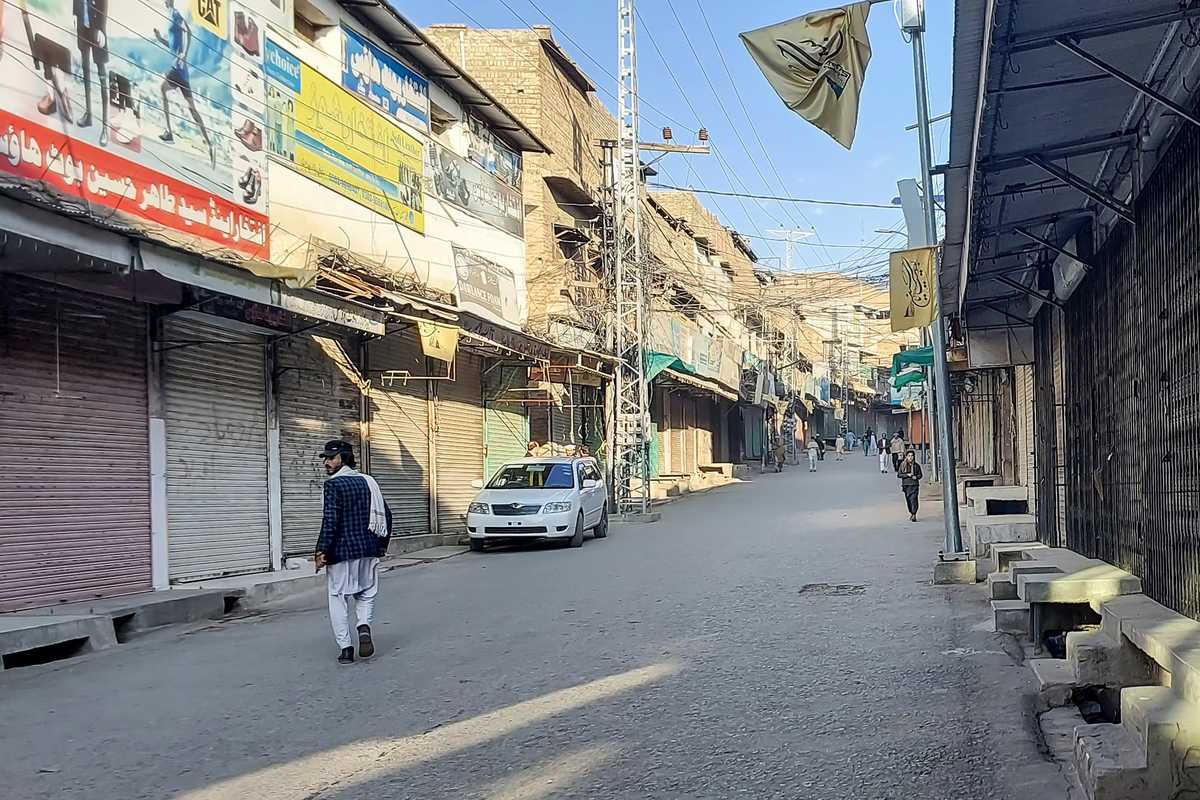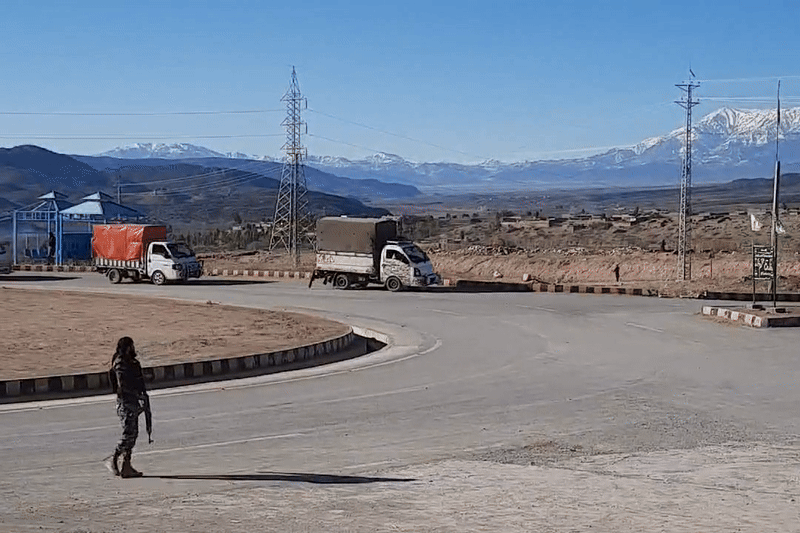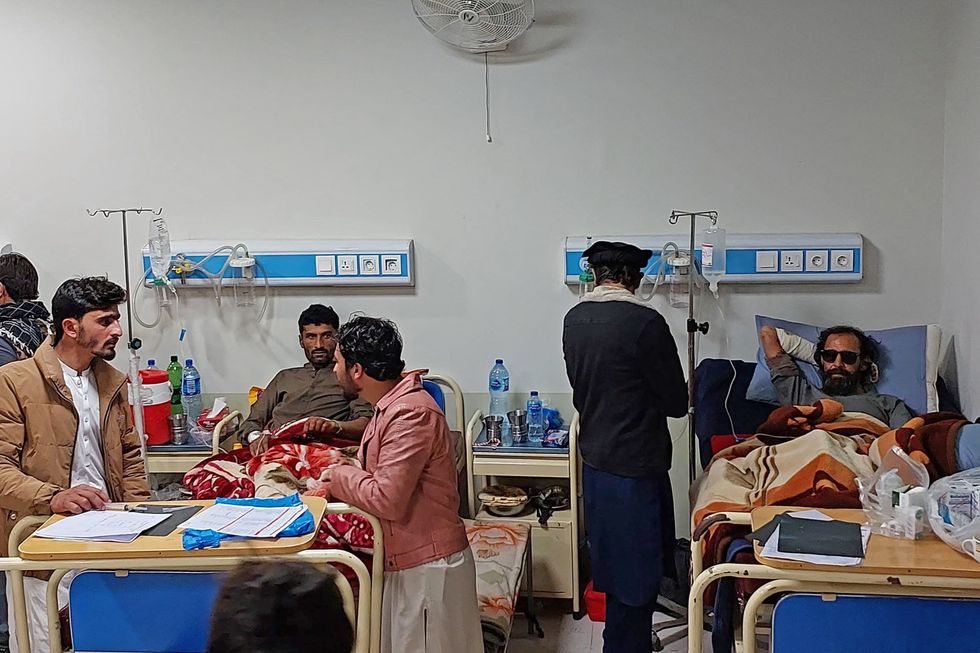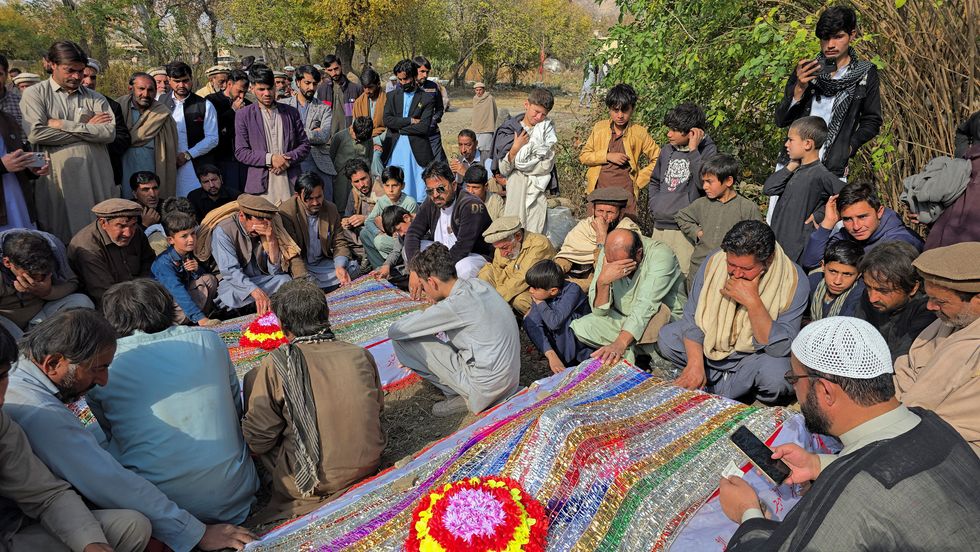Kurram traders strike as protests deepen supply crisis in violence-hit Pakistan district
Parachinar traders shut shops in protest as Bagan residents block trucks, seeking compensation for violence damage

Kamran Ali
Correspondent Nukta
Kamran Ali, a seasoned journalist from Khyber Pakhtunkhwa, Pakistan, has a decade of experience covering terrorism, human rights, politics, economy, climate change, culture, and sports. With an MS in Media Studies, he has worked across print, radio, TV, and digital media, producing investigative reports and co-hosting shows that highlight critical issues.

Men walk past a market closed by traders during a strike against sectarian attacks in Kurram district, Khyber Pakhtunkhwa province, on November 22, 2024.
AFP
37 deaths reported since October due to delayed medical access amid road closures
Over 100 essential supply trucks remain stranded while shops stand empty
Military begins demolishing 300 private bunkers following peace agreement
Traders in Pakistan’s remote Kurram district, plagued by sectarian violence, launched a shutter-down strike on Monday as protests escalated, worsening the region’s supply crisis. One group is demanding the restoration of road access, while another has blocked it, seeking compensation for conflict-related damages.
While some aid trucks reached the district on January 8, local business leaders say hundreds of fully-loaded trucks remain stranded, leaving most shops empty.

"More than 100 trucks carrying essential goods such as rice, sugar, flour, cooking oil, and petrol remain stranded in Tall Hangu, with no clearance in sight," said Nazir Ahmed, president of the local traders' union, criticizing the administration for making repeated promises without taking concrete action.
Ahmed explained that the shutter-down strike was largely symbolic since shops were already empty. "When 25 trucks carrying poultry and vegetables arrived on January 8, the stock was quickly sold out. Now hundreds of shops stand empty without goods," he added.
The traders' protest comes in response to a separate ongoing blockade at Manduri area, where residents of Bagan have been preventing supply trucks from entering the district. While the traders want roads reopened immediately to restore business activity, the Bagan protesters are using the blockade as leverage to secure their demands.

At the Manduri area blockade, protest leader Karim Khan, who had refused to endorse the Grand Jirga's 14-point peace agreement, demanded compensation for more than 400 homes and shops damaged during recent sectarian clashes.
While blocking aid could worsen shortages in their own community, protest leaders argue that without leverage, their demands for compensation will be ignored once regular supplies resume. Therefore, traders and residents of Bagan have resolved to continue their protests until their demands are met.
Burdened hospitals
Dr. Mir Hassan Jan, Medical Superintendent of District Headquarters Hospital Parachinar, said that while the government continues to supply medicines periodically, the shortage of medicines in local markets has significantly increased the burden on the hospital. "Over the past month, our outpatient department (OPD) has treated 29,000 patients," he reported.
He explained that road closures have prevented referred patients from reaching hospitals in other districts. "Tragically, many patients die while waiting for access to care. Since October, at least 37 people have lost their lives due to these delays," he added.
Health Adviser Ihtisham Ali acknowledged that harsh weather conditions had increased the demand for medicines in Kurram, noting a rise in outpatient visits, particularly among children with various illnesses.
Ali assured that medicine supplies to health centers in the district would continue without interruption. "We are using helicopters to deliver medicines, and this arrangement will continue until the situation returns to normal," he added.
Bunker demolition begins in Kurram
Meanwhile, the demolition of private bunkers has begun in Kurram's Khar Kali and Balish Khel areas, following an apex committee decision and peace agreement.
Police Control Room Sadda confirmed to Nukta that two bunkers have been demolished, one from each group. Frontier Corps, Army, and Police personnel are present at the sites, while gunship helicopters patrol the area.
Earlier, the deputy commissioner's office had planned to begin demolitions on January 12, but postponed due to local resistance. Sources said residents demanded weapons be collected from all tribes before proceeding.
Additional Deputy Commissioner Zahid Usman told Nukta that officials are surveying approximately 300 bunkers across Kurram district while working with local elders on strategy. "According to the Apex Committee, all bunkers must be demolished by February 1, after which the roads will be reopened," he said.
Timeline of Kurram crisis
Kurram, a district bordering Afghanistan, has historically been a flashpoint for sectarian conflict between Sunni and Shia communities.
The crisis escalated on November 21 last year when an attack on a passenger convoy traveling from Parachinar to Peshawar killed 43 people. This incident sparked retaliatory sectarian violence that claimed more than 150 lives and injured 200 others, leading to the closure of the district's only highway.

On December 20, the provincial apex committee on security gave both factions a 15-day deadline to reach an agreement. The committee ordered the dismantling of private bunkers and disarmament of individuals to restore stability.
On January 1, the Kurram Grand Jirga signed a 14-point peace accord, though not all stakeholders endorsed the agreement. The situation deteriorated on January 4 when attackers targeted the Deputy Commissioner's convoy, undermining efforts to restore peace.
Despite these setbacks, humanitarian aid began reaching the district by January 8, but local protests over business closures and demands for compensation continue unabated.







Comments
See what people are discussing